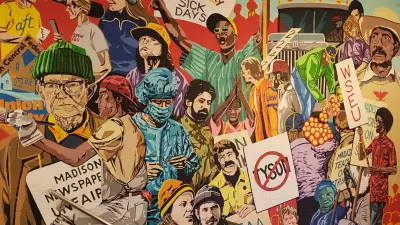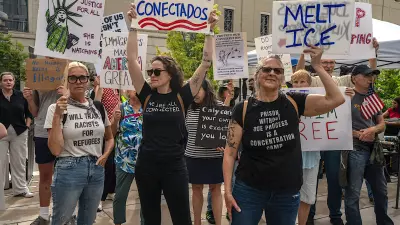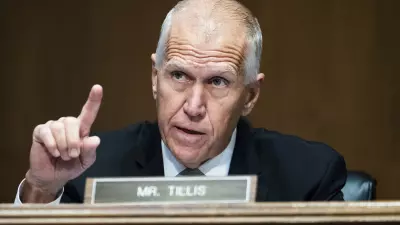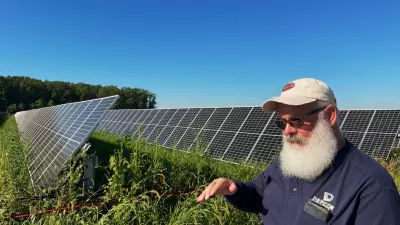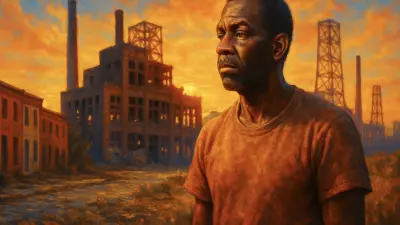Last week, The New York Times podcast “The Daily” did an excellent segment with reporter Dan Kaufman on his story “How NAFTA Broke American Politics.”

Kaufman focuses on Masterlock, the iconic Milwaukee lock company that outsourced 1,000 jobs to Mexico shortly after then-President Bill Clinton signed the North American Free Trade Agreement (NAFTA). Masterlock shut down its entire Milwaukee operation this year. In the podcast, you can hear former Masterlock worker Chancie Adams describe the arc of his disaffection from the Democratic Party. It’s a painful journey.
Adams’ family was part of the Great Migration of Black Americans from the South who moved to Milwaukee when the city was a manufacturing powerhouse. He was the first among his relatives able to buy a house, thanks to his union wages. The union got him involved in politics, too, and he actually met President Barack Obama when Obama made a campaign stop at Masterlock in 2012. “Milwaukee, we are not going back to an economy that’s weakened by outsourcing and bad debt and phony financial profits,” Obama told Masterlock employees, praising the company’s decision to bring back some of its previously outsourced jobs. But a few years later the company moved all the jobs away and shut its Milwaukee plant.
After supporting Obama, Adams won’t be voting in 2024, he said. “I’m done with all that,” he told Kaufman. He has no faith that Harris will do anything to help people like him. All politicians are crooks, in Adams’ view. But if he did vote, he’d probably cast his ballot for former President Donald Trump, he said. Trump’s a crook, too, but “he’s a gangster,” Adams said, laughing.
I’ve heard similar reactions from Wisconsin dairy farmers who voted for Trump in 2016 and 2020. They liked it when Trump pledged to remember “the forgotten men and women of America.” They laughed off some of his outrageous statements. As a political outsider, they felt he would throw a rock at the two-party system that, in their view, abandoned ordinary people and really only served the interests of big corporations, especially when it came to trade deals like NAFTA.
Disappearing factories and farms
In addition to spurring devastating job losses at manufacturing plants in places like Milwaukee, Janesville, and Racine, NAFTA helped make Wisconsin the No. 1 state in the nation for farm bankruptcies, accelerating the “get big or get out” trend in agriculture. Wisconsin lost more than half its family farms during the early 2000s.
Don’t get me wrong. The Democrats were not solely responsible for trade deals that made investors rich by setting off a race to the bottom in wages and prices. Mainstream candidates of both major political parties embraced “free trade,” while on the right and left-wing margins, conservative commentator and 1992 presidential candidate Pat Buchanan and socialist U.S. Sen. Bernie Sanders sounded the alarm that what was good for Wall Street could be devastating for Main Street.
Kaufman does a good job documenting how NAFTA “signaled the Democratic Party’s move away from its working-class, New Deal roots.” I remember that shift in the early 1990s when liberal intellectuals and New Democrats sneered at down-at-the-heel union workers and farmers and began embracing more upscale suburban voters.
“For every blue-collar Democrat we lose in western Pennsylvania, we will pick up two moderate Republicans in the suburbs in Philadelphia,” Kaufman quotes Democratic Senate Majority Leader Chuck Schumer saying before the 2016 election. “And you can repeat that in Ohio and Illinois and Wisconsin.”
That strategy didn’t work out too well for the Democrats in 2016. And despite Biden’s narrow victory in 2020, it’s still a problem for them in 2024.
This criticism is maddening to Democrats who point out President Joe Biden’s pro-union record, including being the first president to walk a picket line, his creation of 765,000 new manufacturing jobs, and massive federal investments in job creation, infrastructure, and clean energy projects — plus low unemployment and wage growth.
Biden came to Wisconsin this year to visit the site of the failed Foxconn plant, to tout a new Microsoft A.I. facility that will create 1,000 jobs on the site where Trump promised “the Eighth Wonder of the World” but where, after billions in public investment, the promised Foxconn facility never materialized.
Contrary to his rhetoric about representing the working class, Trump created a huge trade deficit, and his 2017 tax cut gave corporations a new incentive to offshore jobs by cutting taxes on foreign profits.
Still, Trump and his running mate, J.D. Vance, have capitalized on the Democrats’ decision in the 1990s to shift away from working-class concerns and embrace NAFTA. They are speaking directly to the voters who were left behind.
One farmer I interviewed for my book “Milked: How an American Crisis Brought Together Midwestern Dairy Farmers and Mexican Immigrants” said he wouldn’t vote for Hillary Clinton because Bill Clinton signed NAFTA. It’s worth remembering that in Wisconsin, a critical battleground state, Sanders won the Democratic primary in 2016 by a massive 13-point margin over Hillary Clinton.
Speaking to working-class voters
For her part, Harris says she would have voted against NAFTA were she in the U.S. Senate when it came up. She has promised to continue Biden’s pro-union efforts and to support and protect U.S. manufacturing.
But unlike Trump and Vance, Harris doesn’t have a big-picture story to tell “the forgotten men and women” that reverses the impression that Democrats are mostly the party of sophisticated city-dwellers and suburbanites. Her plans to help first-time home buyers come up with a downpayment, expand Medicare to include long-term care, and help families cover the costs of child care — all part of what she calls the “opportunity economy” — are good. But they sound like a grab bag of technocratic solutions to economic upheaval that has played out in the lives of ordinary workers and farmers as an epic catastrophe — something a lot of Democrats haven’t acknowledged.
One exception is Wisconsin Democratic Sen. Tammy Baldwin, a staunch opponent of global trade deals, including Most Favored Nation trading status for China and Obama’s Trans-Pacific Partnership deal. Baldwin has championed Made in America rules and is constantly visiting farms and pushing investment in ag innovation and in Wisconsin manufacturers.
In a recent campaign ad, a parade of Teamsters truck drivers wearing baseball caps and their family members praise Baldwin, saying she “fought like hell” and saved their pensions after their employer tried to cut their retirement savings in half. “You don’t forget something like that,” one guy says. That’s the kind of message that helps Baldwin win in districts that voted heavily for Trump.
There’s a lot at stake in the coming election: reproductive freedom, a potentially brutal crackdown on immigrants, voting rights, and even the survival of democracy itself.
But one of the most important questions candidates must answer is who is looking out for working-class Midwesterners. Many Democrats have taken a pass on that issue in recent years. Unless they make it very clear that has changed, it will come back to bite them.

